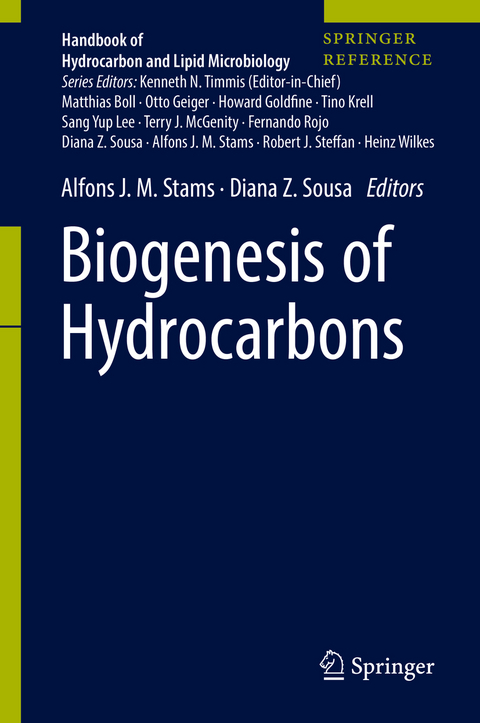
Biogenesis of Hydrocarbons
Springer International Publishing (Verlag)
978-3-319-78107-5 (ISBN)
The chapters are organised into four themed parts:1. Biochemistry of Biogenesis - Hydrocarbons2. Taxonomy, Ecophysiology and Genomics of Biogenesis - Hydrocarbons3. Biogenic Communities: Members, Functional Roles4. Global Consequences of Methane Production
Prof. Alfons J.M. Stams is personal chair professor at Wageningen University & Research (Wageningen, The Netherlands) and visiting professor at the University of Minho (Braga, Portugal). He studied Molecular Sciences at the Agricultural University of Wageningen and received his Ph.D. in 1985 on the ecophysiology of sulfate-reducing bacteria at the University of Groningen. After a postdoc period, he became leader of the Microbial Physiology group of Wageningen University. His main research focus was the physiology and ecology of anaerobic microbial communities that play a crucial role in environmental biotechnological processes, such as wastewater treatment and soil and groundwater remediation. Main research areas included syntrophic communities of anaerobic bacteria and methanogenic archaea, sulfate- and sulfur-reducing bacteria, and bacteria that respire with organic and inorganic chlorine compounds. He has supervised more than 50 Ph.D. students and published more than 400 articles in peerreviewed journals and books. He is editor of FEMS Microbial Ecology and of Applied and Environmental Microbiology. His teaching activities mainly concerned the physiology and biotechnological application of microorganisms. Dr. Diana Z. Sousa is associate professor atWageningen University & Research (Wageningen, The Netherlands) and group leader of the Microbial Physiology group within the Laboratory of Microbiology of this university. She studied Biological Engineering at the University of Minho and obtained her Ph.D. from the same university in 2007. During her Ph.D., she specialized on the microbiology of the conversion of long-chain fatty acids (LCFA) to methane in anaerobic reactors and, inherently, on obligate syntrophic microorganisms. From 2007 to 2013, she worked as assistant professor in the Department of Biological Engineering at the University of Minho, and in 2013 she moved to the Laboratory of Microbiology at Wageningen University & Research. Her current interest lies in the study of the metabolic pathways, microbes, and (synthetic) microbial networks that convert one-carbon molecules such as carbon monoxide, carbon dioxide, methane, and methanol and their application to produce high-value chemical building blocks. Other topics researched by her group include syntrophy, methanogenesis, sulfur cycle, and, more recently, electromicrobiology. She has published over 60 articles and book chapters and has supervised 16 Ph.D. students (7 completed). She is active in several education and research groups, such as theWageningen Young Academy (since 2018), with a focus on the development and promotion of sciencesociety- policy nexus
Introduction to Microbial Hydrocarbon Production: Bioenergetics.- Diversity and Taxonomy of Methanogens.- Hydrogenotrophic Methanogenesis.- Ecophysiology of Acetoclastic Methanogens.- Methanogenesis from Carbon Monoxide.- Environmental Constraints that Limit Methanogenesis.- Methanogens: Syntrophic Metabolism.- Methanogenesis in Soils, Wetlands, and Peat.- Methanogenesis in the Digestive Tracts of Insects and Other Arthropods.- Methanogenesis at High Latitudes.- Methanogens and Methanogenesis in Hypersaline Environments.- Metagenomics of Methanogenic Communities in Rice Paddy Rhizosphere; the Importance of Methanocella.- Metagenomics of Methanogenic Communities in Anaerobic Digesters.- Anaerobic Digestion as Key Technology in the Bio-Based Economy.- Oxic Methane Cycling: New Evidence for Methane Formation in Oxic Lake Water.- Contribution of Methane Formation and Methane Oxidation to Methane Emission from Freshwater Systems.- Diversity and Taxonomy of Aliphatic Hydrocarbon Producers.- Alkane Biosynthesis in Bacteria.- Oil and Hydrocarbon-Producing Bacteria.-
| Erscheinungsdatum | 16.08.2019 |
|---|---|
| Reihe/Serie | Handbook of Hydrocarbon and Lipid Microbiology |
| Zusatzinfo | XVI, 499 p. 66 illus., 45 illus. in color. |
| Verlagsort | Cham |
| Sprache | englisch |
| Maße | 155 x 235 mm |
| Gewicht | 929 g |
| Themenwelt | Naturwissenschaften ► Biologie ► Mikrobiologie / Immunologie |
| Schlagworte | Alkanes • alkane synthesis • Biogenesis • environmental biotechnology • Hydrocarbons • methane • methane cycling environment • methanogenic Archaea • microbial communities • microbial oil • natural environments |
| ISBN-10 | 3-319-78107-3 / 3319781073 |
| ISBN-13 | 978-3-319-78107-5 / 9783319781075 |
| Zustand | Neuware |
| Haben Sie eine Frage zum Produkt? |
aus dem Bereich


